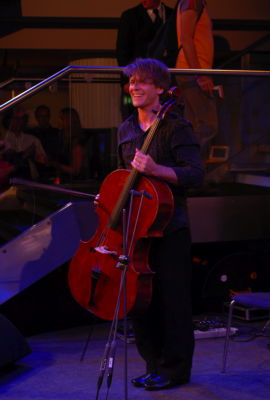|
<<< << -- 4 -- Tess Crebbin HOPE BREAKING THROUGH

About the Kodály that evening, unfortunately not much can be said, although it would have been very interesting to hear how Gerhardt's uniquely sounding cello performed it in its entirety. Of this magnificent cello sonata, written in 1915, I only heard the third movement, which was technically excellently played with its many double stops and pizzicati challenges, though disjointed in its mood setting, since it was taken out of its context. The slow arch of the second movement was missing as a lead-in to the 3rd, and the 1st movement was played, several hours earlier, prior to my arrival.
Since Kodály is by many critics considered to have written the second most demanding music for solo cello after Bach, and since very few cellists would even agree to play it live, one wonders, really wonders, about the sense, or lack of it, of the organizers of the Long Night of Music in Munich. Here was a cellist of great renown who not only agreed to appear but offered to play this thirty-minute highly difficult and much-loved suite in its entirety -- and they declined. Instead, Gerhardt was asked to play the Kodály first movement at around 8pm, then the third just before midnight, and then around 1am, he delivered the Moderato by the late Rostropovich. Plenty of time, one would think, with a slight change in plan, to fit in the entire Kodály. Just ask the audience: 'We would have much rather had Kodály;' was the consensus, even from the security guard out front, whose sister happens to be a budding cellist and who himself had attended a classical music high school.

Gerhardt takes his bows in Munich. Photo © 2008 Frank Langbein
|
Be that as it may, it was certainly worthwhile, and Gerhardt will be back in Munich in a few weeks time, when he will appear in concert with the Bavarian Radio Symphony Orchestra. Afterwards, if time allows, he intends to sit down with us for a longer interview about his cello than was possible at 1am during the long night of music.
Copyright © 14 June 2008
Tess Crebbin, Munich, Germany

|

